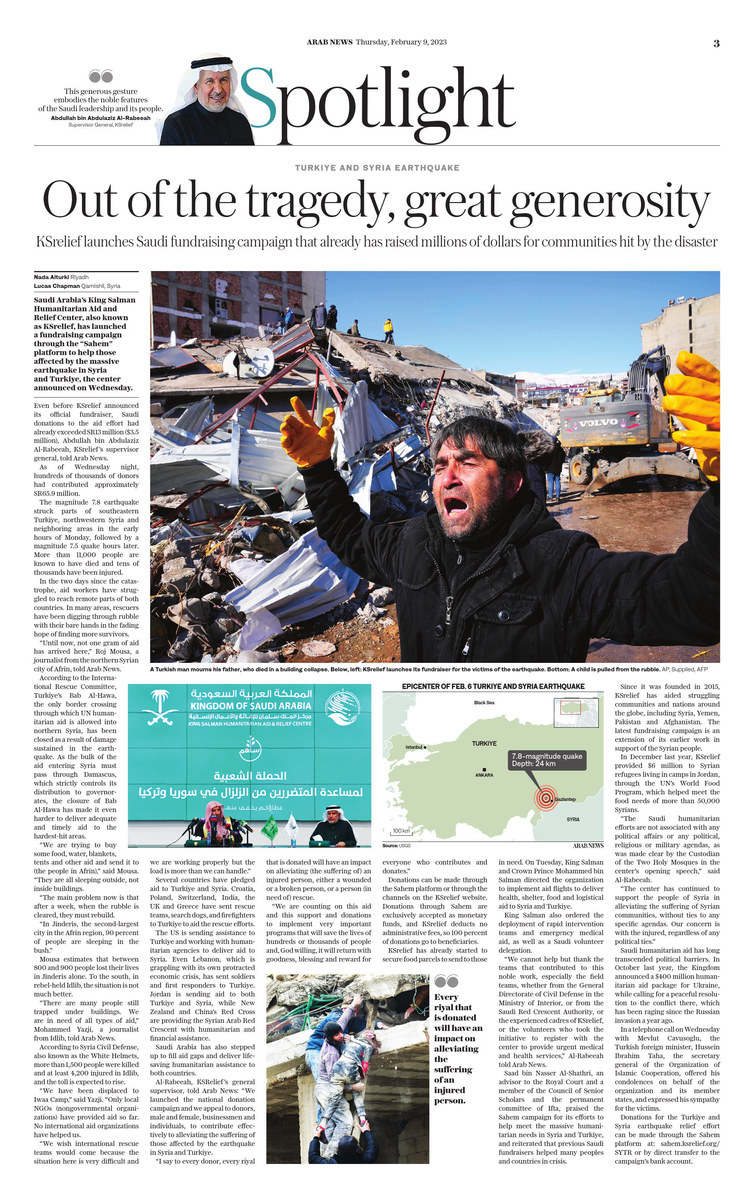RIYADH/QAMISHLI: Saudi Arabia’s King Salman Humanitarian Aid and Relief Center, also known as KSrelief, has launched a fundraising campaign through the “Sahem” platform to help those affected by the massive earthquake in Syria and Turkiye, the center announced on Wednesday.
Even before KSrelief announced its official fundraiser, Saudi donations to the aid effort had already exceeded SR13 million ($3.5 million), Abdullah bin Abdulaziz Al-Rabeeah, KSrelief’s supervisor general, told Arab News.
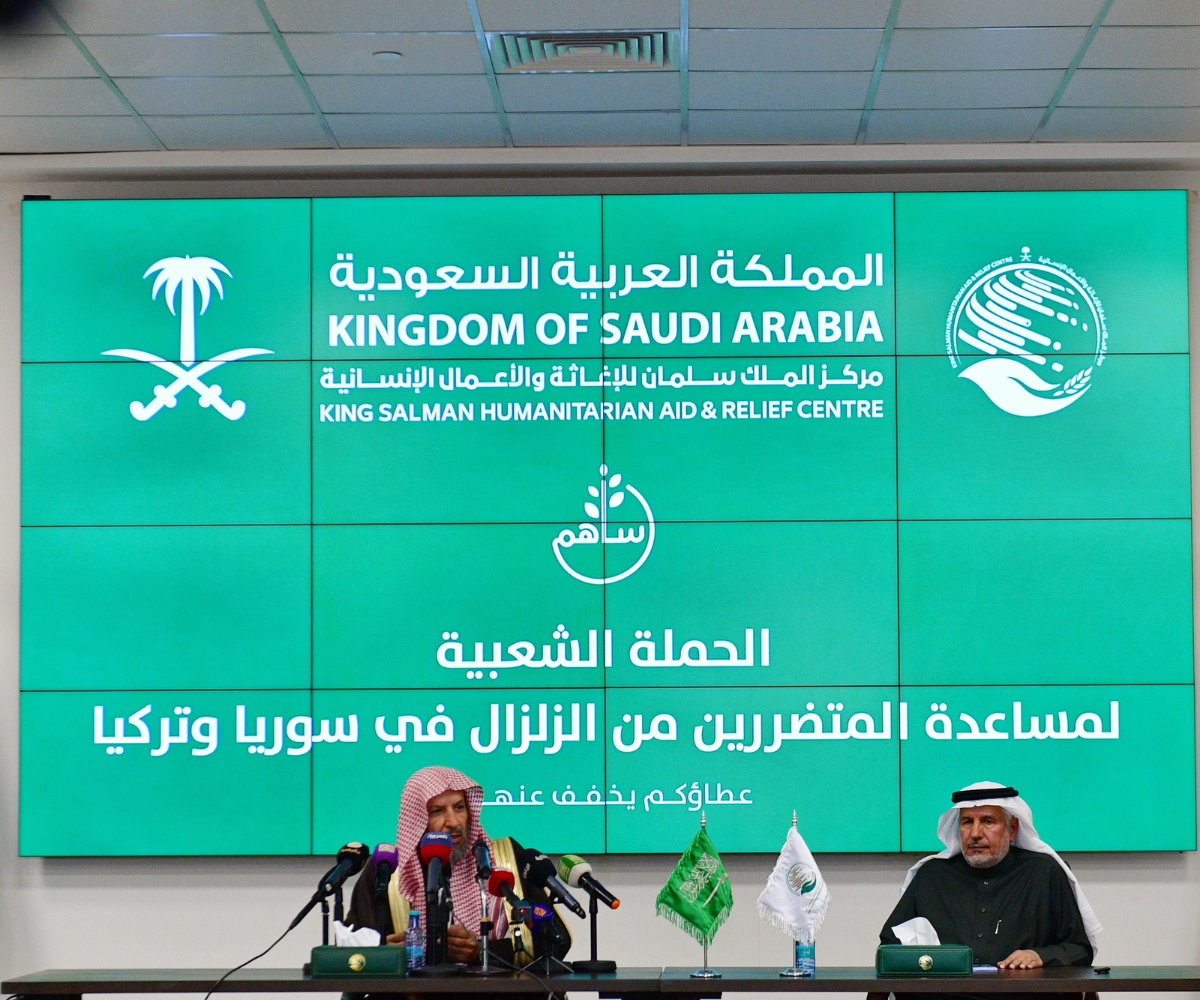
KSrelief chief Dr. Abdullah Al-Rabeeah (R) and Sheikh Saad Al-Shathri, a member of the Saudi Council of Senior Scholars, leading the launch of the Kingdom's aid campaign for victims of the Turkiye-Syria earthquake. (Twitter: @KSrelief)
As of Wednesday night, hundreds of thousands of donors had contributed approximately SR65.9 million.
The magnitude 7.8 earthquake struck parts of southeastern Turkiye, northwestern Syria and neighboring areas in the early hours of Monday, followed by a magnitude 7.5 quake hours later. More than 11,000 people are known to have died and tens of thousands have been injured.
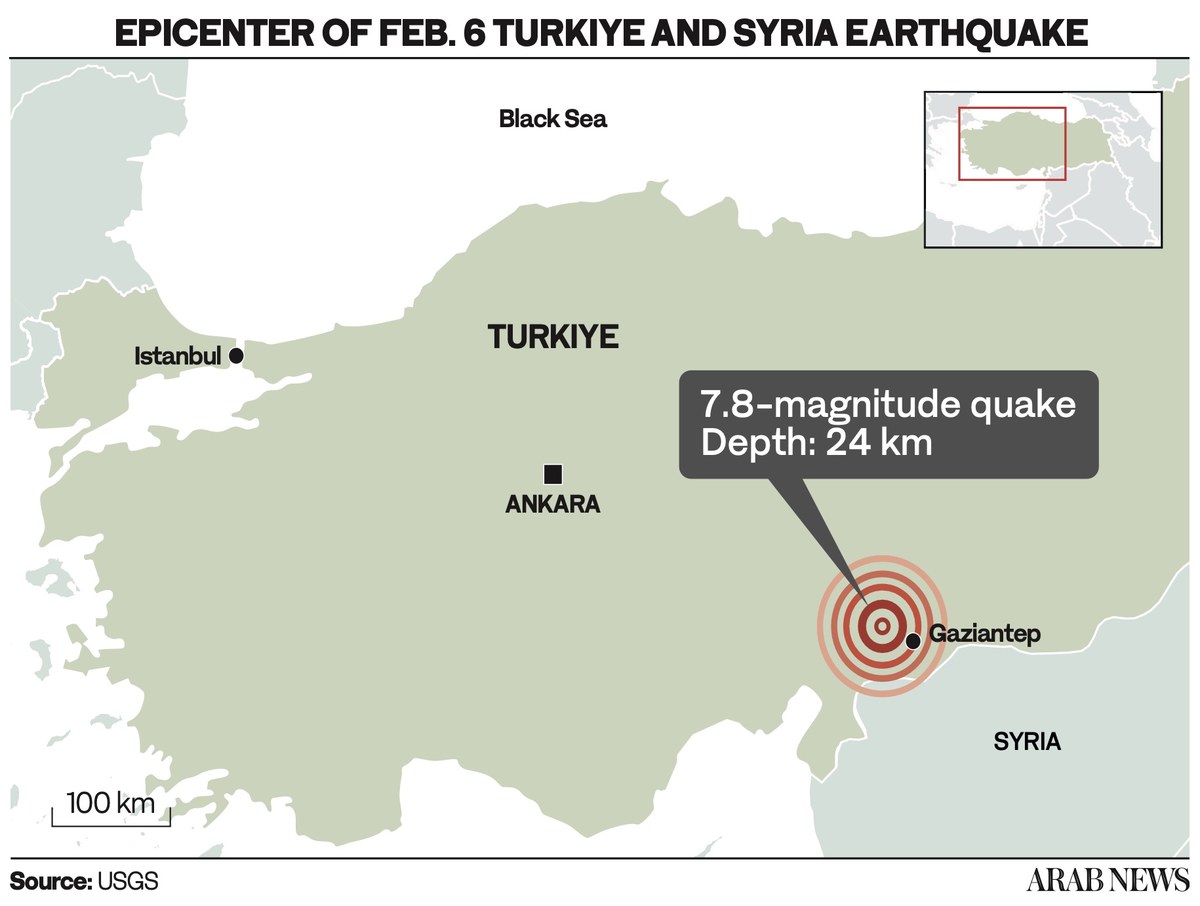
In the two days since the catastrophe, aid workers have struggled to reach remote parts of both countries. In many areas, rescuers have been digging through rubble with their bare hands in the fading hope of finding more survivors.
“Until now, not one gram of aid has arrived here,” Roj Mousa, a journalist from northern Syrian city of Afrin, told Arab News.
According to the International Rescue Committee, Turkiye’s Bab Al-Hawa, the only border crossing through which UN humanitarian aid is allowed into northern Syria, has been closed as a result of damage sustained in the earthquake. As the bulk of the aid entering Syria must pass through Damascus, which strictly controls its distribution to governorates, the closure of Bab Al-Hawa has made it even harder to deliver adequate and timely aid to the hardest-hit areas.
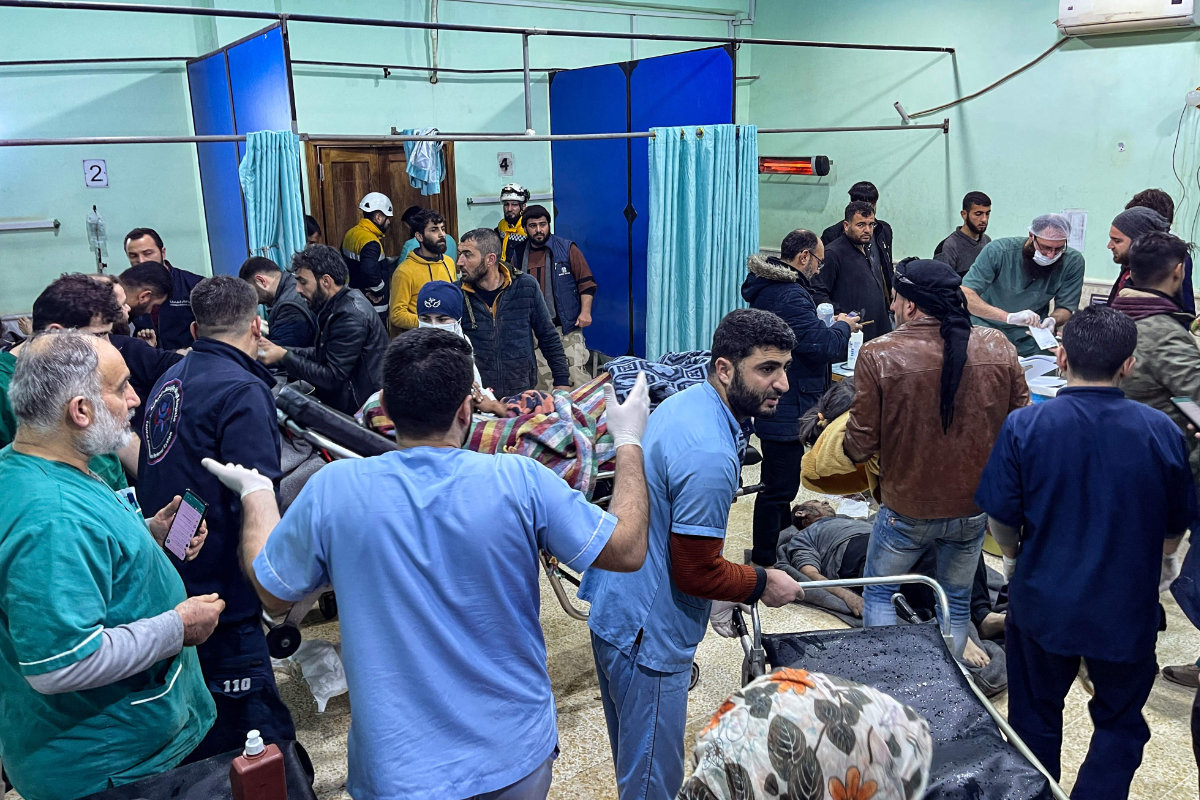
Earthquake victims are rushed to the emergency ward of the Bab al-Hawa hospital in Syria's Idlib province on the border with Turkey early on Feb. 6, 2023. (AFP)
“We are trying to buy some food, water, blankets, tents and other aid and send it to (the people in Afrin),” said Mousa. “They are all sleeping outside, not inside buildings. The main problem now is that after a week, when the rubble is cleared, they must rebuild. In Jinderis, the second-largest city in the Afrin region, 90 percent of people are sleeping in the bush.”
Mousa estimates that between 800 and 900 people lost their lives in Jinderis alone. To the south, in rebel-held Idlib, the situation is not much better.
“There are many people still trapped under buildings. We are in need of all types of aid,” Mohammed Yazji, a journalist from Idlib, told Arab News.
According to Syria Civil Defense, also known as the White Helmets, more than 1,500 people were killed and at least 4,200 injured in Idlib, and the toll is expected to rise.

Syrian rescuers (White Helmets) search for casualties in the rubble of a building destroyed by an earthquake in Syria's Idlib province on the border with Turkey early on February 6, 2023. (AFP)
“We have been displaced to Iwaa Camp,” said Yazji. “Only local NGOs (nongovernmental organizations) have provided aid so far. No international aid organizations have helped us.
“We wish international rescue teams would come because the situation here is very difficult and we are working properly but the load is more than we can handle.”
The World Health Organization said rescuers face a race against time not only to save lives but to ensure the injured survive in dire circumstances.
Robert Holden, the WHO’s earthquake-response incident manager, said the immediate focus was on saving lives but it is also “imperative to make sure that those who survived the initial disaster … continue to survive.”
Speaking during a press conference in Geneva, he said: “We’ve got a lot of people who have survived now out in the open, in worsening and horrific conditions,” adding that access to clean water, fuel, electricity and communications has been disrupted.
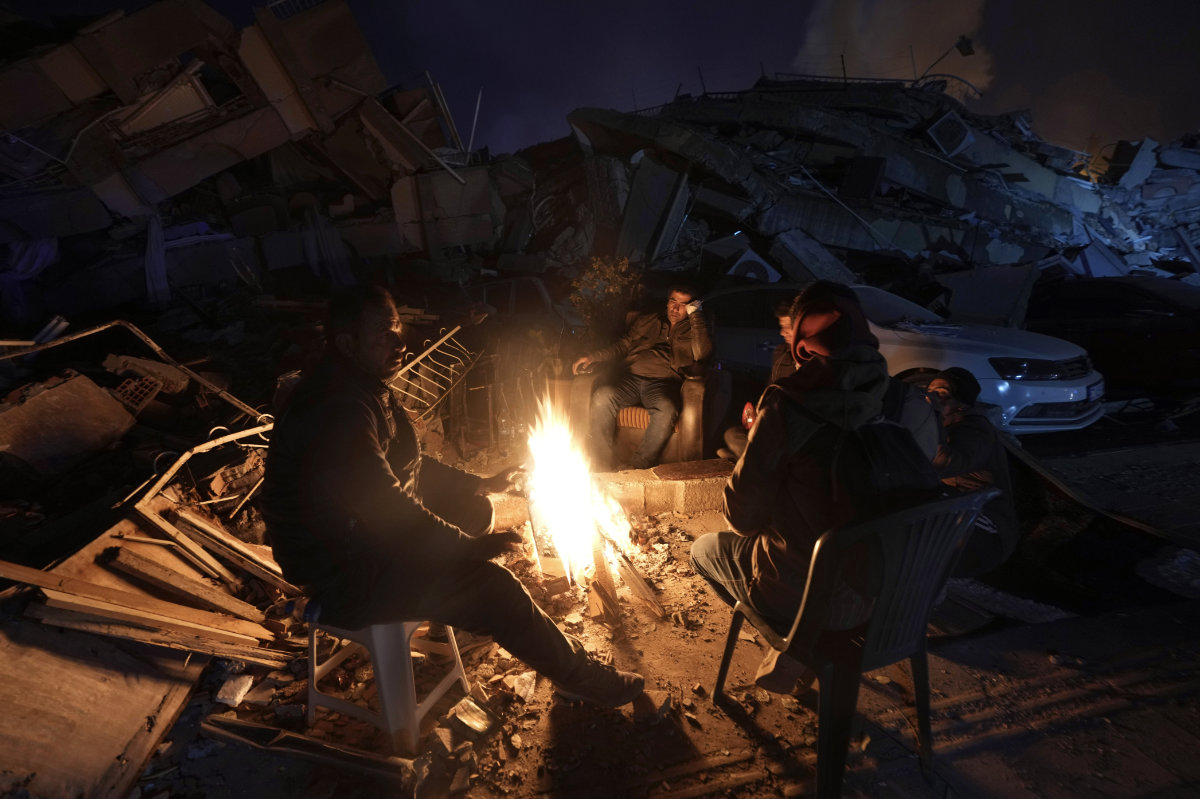
People warm up with fire in front of destroyed buildings in Antakya, southern Turkey, on Feb. 8, 2023. (AP)
“We are in real danger of seeing a secondary disaster which may cause harm to more people than the initial disaster if we don’t move with the same pace and intensity as we are doing on the search and rescue,” he warned. “This is no easy task … The scale of the operation is massive.”
Several countries have pledged aid to Turkiye and Syria. Croatia, Poland, Switzerland, India, the UK and Greece have sent rescue teams, search dogs, and firefighters to Turkiye to aid the rescue efforts.
The US is sending assistance to Turkiye and working with humanitarian agencies to deliver aid to Syria. Even Lebanon, which is grappling with its own protracted economic crisis, has sent soldiers and first responders to Turkiye. Jordan is sending aid to both Turkiye and Syria, while New Zealand and China’s Red Cross are providing the Syrian Arab Red Crescent with humanitarian and financial assistance.
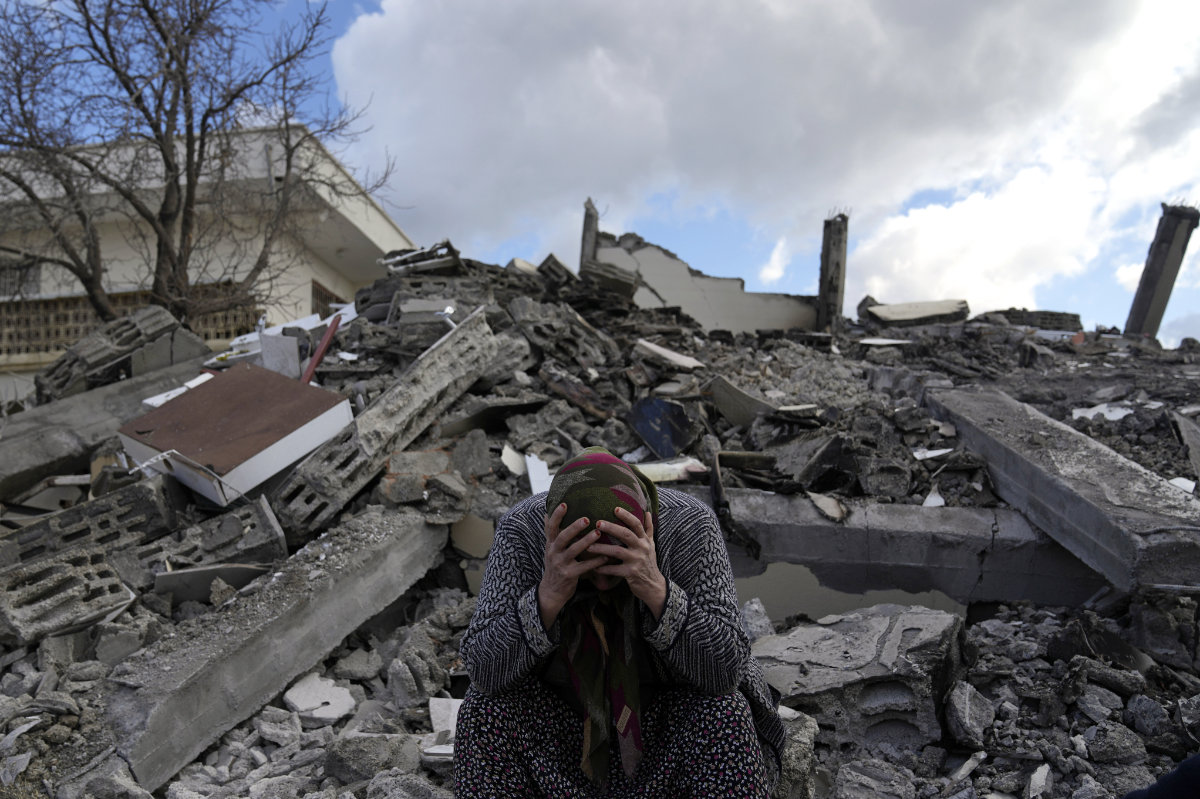
A woman sits on the rubble as emergency rescue teams search for people under the remains of destroyed buildings in Nurdagi town on the outskirts of Osmaniye city southern Turkey, on Feb. 7, 2023. (AP)
Saudi Arabia has also stepped up to fill aid gaps and deliver life-saving humanitarian assistance to both countries.
Al-Rabeeah, KSrelief’s general supervisor, told Arab News: “We launched the national donation campaign and we appeal to donors, male and female, businessmen and individuals, to contribute effectively to alleviating the suffering of those affected by the earthquake in Syria and Turkiye.
“I say to every donor, every riyal that is donated will have an impact on alleviating (the suffering of) an injured person, either a wounded or a broken person, or a person (in need of) rescue.
“We are counting on this aid and this support and donations to implement very important programs that will save the lives of hundreds or thousands of people and, God willing, it will return with goodness, blessing and reward for everyone who contributes and donates.”
Donations can be made through the Sahem platform or through the various channels offered on the KSrelief website. Donations through Sahem are exclusively accepted as monetary funds, and KSrelief deducts no administrative fees, so 100 percent of donations go to beneficiaries.
KSrelief has already started to secure food parcels to send to those in need. On Tuesday, King Salman and Crown Prince Mohammed bin Salman directed the organization to establish an aid corridor to deliver health, shelter, food and logistical supplies to Syria and Turkiye.
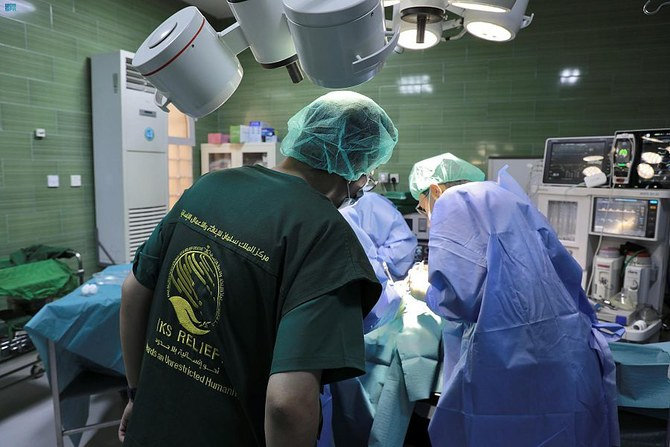
KSrelief has also teams of medics with vast experience serving refugees from Syria and Yemen over the past few years. (SPA file photo)
King Salman also ordered the deployment of rapid intervention teams and emergency medical aid, as well as a Saudi volunteer delegation.
“We cannot help but thank the teams that contributed to this noble work, especially the field teams, whether from the General Directorate of Civil Defense in the Ministry of Interior, or from the Saudi Red Crescent Authority, or the experienced cadres of KSrelief, or the volunteers who took the initiative to register with the center to provide urgent medical and health services,” Al-Rabeeah told Arab News.
Saad bin Nasser Al-Shathri, an advisor to the Royal Court and a member of the Council of Senior Scholars and the permanent committee of Ifta, praised the Sahem campaign for its efforts to help meet the massive humanitarian needs in Syria and Turkiye, and reiterated that previous Saudi fundraisers helped many peoples and countries in crisis.
Since it was founded in 2015, KSrelief has aided struggling communities and nations around the globe, including Syria, Yemen, Pakistan and Afghanistan. The latest fundraising campaign is an extension of its earlier work in support of the Syrian people.
In December last year, KSrelief provided $6 million to Syrian refugees living in camps in Jordan, through the UN’s World Food Program, which helped meet the food needs of more than 50,000 Syrians.
“The Saudi humanitarian efforts are not associated with any political affairs or any political, religious or military agendas, as was made clear by the Custodian of the Two Holy Mosques in the center’s opening speech,” said Al-Rabeeah.
“The center has continued to support the people of Syria in alleviating the suffering of Syrian communities, without ties to any specific agendas. Our concern is with the injured, regardless of any political ties.”
Saudi humanitarian aid has long transcended political barriers. In October last year, the Kingdom announced a $400 million humanitarian aid package for Ukraine, while calling for a peaceful resolution to the conflict there, which has been raging since the Russian invasion a year ago.
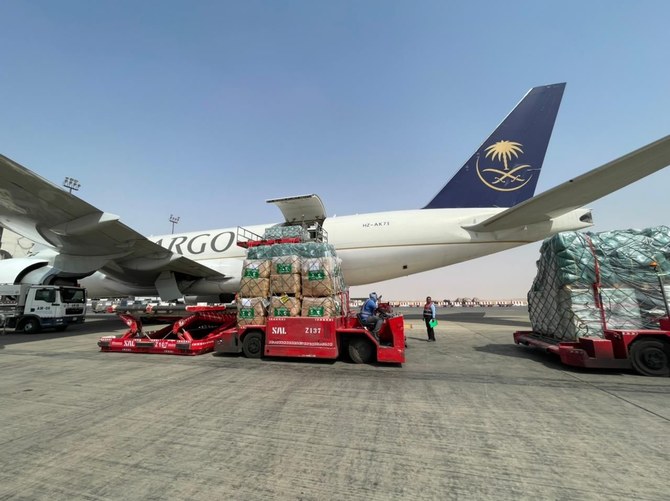
A Saudia cargo plane unloads food and shelter aid at Sudan's Khartoum airport as part of a humanitarian air bridge from Saudi Arabia for flooding victims in the north African country in August 2022. (SPA file photo)
KSrelief has played a leading role in international aid initiatives during past disasters, most significantly for the people of Lebanon in the wake of the Aug. 4, 2020, Beirut port explosion that killed more than 215 people, injured more than 6,500 and displaced about 300,000. The Kingdom sent two aircraft carrying 120 tons of medical and emergency supplies.
KSrelief also recently sent two flights to Sudan carrying food and shelter aid for those affected by last year’s floods. It also aided India’s COVID-19 response by sending an additional 60 tons of oxygen, adding to an initial 80-ton delivery to the South Asian nation.
In a telephone call on Wednesday with Mevlut Cavusoglu, the Turkish foreign minister, Hussein Ibrahim Taha, the secretary general of the Organization of Islamic Cooperation, offered his condolences on behalf of the organization and its member states, and expressed his sympathy for the victims.
Donations for the Turkiye and Syria earthquake relief effort can be made through the Sahem platform using the following link: sahem.ksrelief.org/SYTR, or by direct transfer to the campaign’s bank account.
